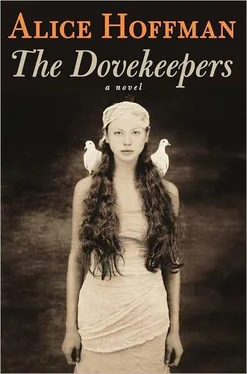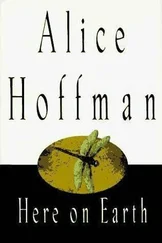Alice Hoffman - The Dovekeepers
Здесь есть возможность читать онлайн «Alice Hoffman - The Dovekeepers» весь текст электронной книги совершенно бесплатно (целиком полную версию без сокращений). В некоторых случаях можно слушать аудио, скачать через торрент в формате fb2 и присутствует краткое содержание. Год выпуска: 2011, ISBN: 2011, Жанр: Историческая проза, на английском языке. Описание произведения, (предисловие) а так же отзывы посетителей доступны на портале библиотеки ЛибКат.
- Название:The Dovekeepers
- Автор:
- Жанр:
- Год:2011
- ISBN:978-1-4516-1749-8
- Рейтинг книги:2.5 / 5. Голосов: 2
-
Избранное:Добавить в избранное
- Отзывы:
-
Ваша оценка:
- 60
- 1
- 2
- 3
- 4
- 5
The Dovekeepers: краткое содержание, описание и аннотация
Предлагаем к чтению аннотацию, описание, краткое содержание или предисловие (зависит от того, что написал сам автор книги «The Dovekeepers»). Если вы не нашли необходимую информацию о книге — напишите в комментариях, мы постараемся отыскать её.
The Dovekeepers — читать онлайн бесплатно полную книгу (весь текст) целиком
Ниже представлен текст книги, разбитый по страницам. Система сохранения места последней прочитанной страницы, позволяет с удобством читать онлайн бесплатно книгу «The Dovekeepers», без необходимости каждый раз заново искать на чём Вы остановились. Поставьте закладку, и сможете в любой момент перейти на страницу, на которой закончили чтение.
Интервал:
Закладка:
“I can’t reconsider my faith, Yaya.”
“Then consider your life” was my answer.
To tease me, Amram clucked like a chicken, strutting, his lean, strong body hunched over as he flapped imaginary wings. “Do you want me to stay home in the henhouse, where you can lock me inside and make sure I’m safe?”
I laughed despite my fears. My brother was brave and beautiful. No wonder my father favored him. His hair was golden, his eyes dark but flecked with light. I saw now that the child I had once mothered had become a man, one who was pure in his intentions. I could do little more than object to the path that he chose. Still I was determined to act on his behalf. When my brother rejoined his friends, I went on through the market, making my way deep within the twisting streets, at last turning in to an alley that was cobbled with dusty, dun-colored bricks. I’d heard it was possible to buy good fortune nearby. There was a mysterious shop spoken about in whispers by the neighborhood women. They usually stopped their discussion when I came near, but I’d been curious and had overheard that if a person followed the scrawled image of an eye inside a circle she would be led to a place of medicines and spells. I took the path of the eye until I came to the house of keshaphim, the breed of magic practiced by women, always pursued in secret.
When I knocked on the door, an old woman came to study me. Annoyed by my presence, she asked why I’d come. As soon as I hesitated, she began to close the door against me, grumbling.
“I don’t have time for someone who doesn’t know what she wants,” she muttered.
“Protection for my brother,” I managed to say, too unnerved to reveal any more.
At the Temple there was the magic of the priests, holy men who were anointed by prayer, chosen to give sacrifices and attempt miracles and perform exorcisms, driving out the evil that can often possess men. In the streets there was the magic of the minim, who were looked down upon by the priests, called charlatans and impostors by some, yet who were still respected by many. Houses of keshaphim, however, were considered to engage in the foulest sort of magic, women’s work, evil, vengeful, practiced by those who were denounced as witches. But the min who performed curses and spells would have never spoken to a girl such as I if I had no silver to hand over and no father or brother to recommend me. And had I gone to the priests for an amulet, they would have denied me, for I was the daughter of one who opposed them. Even I knew I didn’t deserve their favor.
The room behind the old woman was unlit, but I glimpsed herbs and plants draped from the ceiling on lengths of rope. I recognized rue and myrtle and the dried yellow apples of the mandrake, what is called yavrucha, an herb that is both aphrodisiac and antidemonic in nature, poisonous and powerful. I thought I heard the sound of a goat, a pet witches are said to have, from inside the dim chamber.
“Before you waste my time, do you have shekels enough for protection?” the old woman asked.
I shook my head. I had no coins, but I’d brought a precious hand mirror with me. It had belonged to my mother and was beautifully crafted, made of bronze and silver and gold, set with a chunk of deep blue lapis. It was the one thing I had of any value. The ancient woman examined it and then, satisfied, took my offering and went inside. After she shut the door, I heard the clatter of a lock. For a moment I wondered if she had disappeared for good, if perhaps I’d never see her or my mirror again, but she came back outside and told me to open my hand.
“You’re sure you don’t want this charm for yourself?” she cautioned, insisting there was only one like it in all the world. “You might need protection in this life.”
I shook my head, and as I did my plain woolen veil fell. When the old woman saw the scarlet color of my hair, she backed away as though she’d discovered a demon at her door.
“It’s good you don’t want it,” she said. “It wouldn’t work for you. You need a token that’s far more powerful.”
I snapped up the charm, then turned and started away. I was surprised when she called for me to wait.
“You don’t ask why?” The market woman was signaling to me, urging me to return, but I refused. “You don’t want to know what I see for you, my sister? I can tell you what you will become.”
“I know what I am.” I was the child born of a dead woman, the one who couldn’t bear to look at her own face. I was immensely glad to be rid of that mirror. “I don’t need you to tell me,” I called to the witch in the alleyway.
I WENT HOME and delivered the gift to my brother; it was a thin silver amulet to wear around his neck, the medallion imprinted with the image of Solomon fighting a demon prostrate before him on the ground. On the back of the charm, The Seal of God had been written in Greek along with the symbol of a key, to signify the key Moses had possessed that had unlocked God’s protection. So, too, would this amulet protect my brother in the blood-soaked future he was set upon.
Amram was delighted with the token. He claimed I had the ability to know his mind, for he had been praying for guidance and wisdom, the smallest portion of that which God had once granted to Solomon. I kept from him that it was the woman who dabbled in magic who had known what he’d desired, not I.
The demons, my brother pledged, must never win. That was the mission of the Sicarii, and they could not fail. He opened his heart, and when he spoke, I believed in him. Amram had a way of convincing a listener to accept the world with his vision, making it possible to see through his eyes. When I gazed upon my brother, all that was before me was the kingdom of Zion and our people free at last.
In very little time, my brother surpassed my father at their dark task. He was the best not by chance but by choice. He learned the ways of the assassin from my father and also from a man named Jachim ben Simon, who had become his teacher. Ben Simon was said to know death better than most and was revered for his use of a double-edged knife made of silver. Under his tutelage, Amram was determined to go forward with his skill, to rise above all others. My brother was devoted, practicing with the intensity of a master craftsman. But as he did so, his moods and tempers changed before my eyes. I watched the boy I knew disappear and a cold, fearless assassin take his place. From our father he learned to slip through the night unseen and climb towers using a single strand of rope wound around his waist. He practiced silence, not speaking for days on end, becoming so still that even the mice in our garden failed to notice him. He went barefoot to ensure there was no sound when he approached, only the suddenness of the blade, taught by Ben Simon, taken even further by Amram’s own natural grace.
Before long, my brother was called upon for the most dangerous assignments, all of which carried the chill of death. Although he hadn’t the cloak that was said to grant invisibility, his great gift was his ability to disguise himself. He dressed as a priest or as a poor man, hiding himself in borrowed garments, gaining access to whomever was considered to be a traitor. He could make himself appear ancient, his face transformed by etched lines of charcoal, or seem a mere boy, eyes shining. People whispered that he was invincible, and it was soon rumored that the amulet of Solomon around his neck protected him from evil. His friends adored him and called him Hol, the name of the phoenix. They vowed that he resembled this mystical bird that arose from fire and ash; he escaped from every attempt the officials made to catch and murder him.
Because of my father and brother, other men were afraid to speak to me. The Sicariis’ deeds were mysterious, but there were some secrets everyone knew, especially in Jerusalem. The men of my family were pointed to in the street, whispered about, both revered and despised. No wonder no one would have me as his wife, not even the brute who drove donkeys to the market. I was a young woman, but I was treated like a beggar, scorned, my reputation tarnished. It was only when men saw the unusual color of my hair that I noticed their curiosity and, often, their desire. Their gazes were disconcertingly sexual, obvious even to one as inexperienced as I. I knew I would enter their dreams when they couldn’t control what they yearned for. But a dream is worthless in the world. What good did their desire do for me? In the light of the day, they walked right by. I wanted to shout out Take me to every man who passed by. Rescue me from what has happened, from the pillar of bitter salt I have become, from the crime I committed before I was born, from the men of my house, who lurk outside the Temple seeking only revenge. Take me to your bed, your house, your city.
Читать дальшеИнтервал:
Закладка:
Похожие книги на «The Dovekeepers»
Представляем Вашему вниманию похожие книги на «The Dovekeepers» списком для выбора. Мы отобрали схожую по названию и смыслу литературу в надежде предоставить читателям больше вариантов отыскать новые, интересные, ещё непрочитанные произведения.
Обсуждение, отзывы о книге «The Dovekeepers» и просто собственные мнения читателей. Оставьте ваши комментарии, напишите, что Вы думаете о произведении, его смысле или главных героях. Укажите что конкретно понравилось, а что нет, и почему Вы так считаете.












